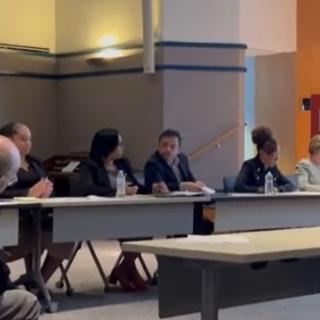Three-C Body Shops is a lot like The Columbus Free Press. Both are fiercely independent and locally owned. And if you haven’t noticed, both are outspoken and unafraid to take on corporate bullies. Three-C and the Free Press are driven to help consumers understand how the corporatization and the consolidation of their respected industries is marginalizing not only them, but also their community.
Three-C owner Bob Juniper, the second-generation patriarch of the company, says the collision repair industry is under attack and being devoured. Four to five companies, he says, are making a serious attempt to monopolize the industry he’s worked for since he was a teenager. One of these companies is Service King Collision Repair, which is majority owned by the Carlyle Group.
Yes, that Carlyle Group – the world’s largest private equity firm that invests heavily in defense and has serious ties to the Bushes and the Saudi royal family. Juniper says this is one conspiracy you need to take seriously: Evidence is growing that the wealthiest global investment firms and their allies in corporate insurance such as Nationwide have eyes on controlling all facets of collision repair.
Juniper says insurance companies with help from investment groups are not only monopolizing collision repair shops, but they’re also buying up used car part sellers, such as Lkq Auto Parts, the nation’s largest provider of recycled auto parts.
“Consolidation of various industries is happening all the time and it’s happening to the collision repair industry,” says Juniper. “The insurance companies and their investors want cradle to grave control. They want to sell you the insurance policy, and if the car gets repaired, they want to control that repair and own the company that does that and do it as cheaply as possible. And they want to supply the parts to those repair shops as cheaply as possible. They want control from front to back.”
Most people will simply brush this off. So what, the corporatization of the collision repair industry doesn’t affect me. But if you get in an accident (and who hasn’t?), then fully understanding what the collision repair monopoly means to you and your family is beyond important.
“All the collision repair shops across the country were mom and pop operations,” says Juniper, “the owner had a lot of vested interest in that facility, it was his life and the quality of his work reflected directly on him and his community. The work was good. They were craftsmen.”
Now think of other corporate giants you’re dealing with. Like your cable company and how crappy the customer service has become. But there’s no comparison, because it’s only your boob-tube.
“The quality of work doesn’t have anybody’s particular name on it. It’s a corporate thing,” he says. “Not only is the service level falling, but also the quality of the work is falling dramatically. Collision repair standards are systematically being destroyed by homogenization.”
Juniper calls it an epidemic of bad collision repair. “People are driving unsafe cars, it’s that simple. I see it every single day. That’s the nucleus of the whole thing.”
The fulcrum of the collision repair monopoly, however, is dependent on one simple thing. What choice their policy holders make. Policy holders can choose any body shop they wish, but like any shady corporation, insurance companies are pressuring or even hoodwinking their customers into using one of their “preferred shops,” which could be a Service King, for example.
But giving policy holders a choice, which many don’t even realize they have, was actually a calculated move by the insurance so to cover their own behinds, says Juniper.
“The insurance companies have left that intact because that’s their safety valve,” he says. “If the insurance companies would force their customers to where they want them to go, they could face liability due to a bad repair. But because they still leave that freedom, they are less likely to have a problem if they get in trouble.”
Because of this epidemic of bad collision repair, Three-C is thriving as a post-repair inspector.
“Because there is so many bad repairs happening people need somewhere to go to have that repair inspected,” he says. “The vehicle owner goes to a shop where the insurance company did the repair and something’s not right, and they go back five or six times, and the shop just can’t make it right. When a car is repaired improperly it’s almost impossible to make it repaired properly. You got a make it right the first time or you got a bad situation on your hands.”



